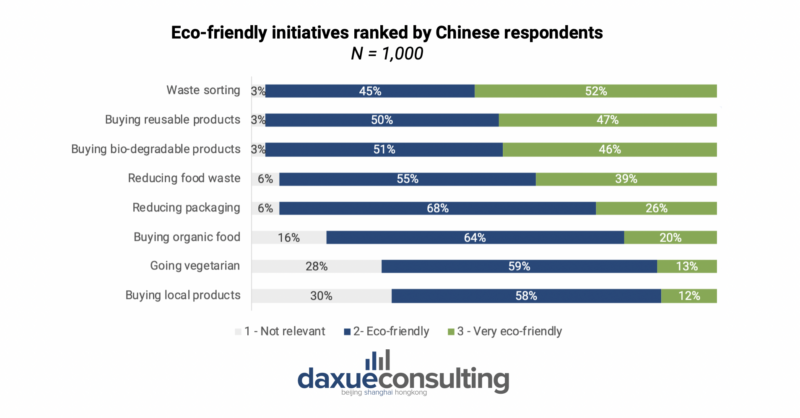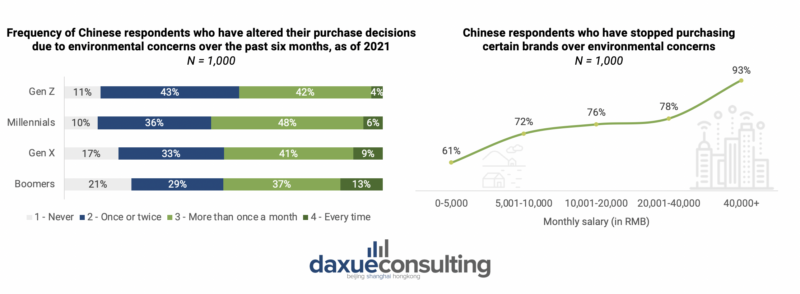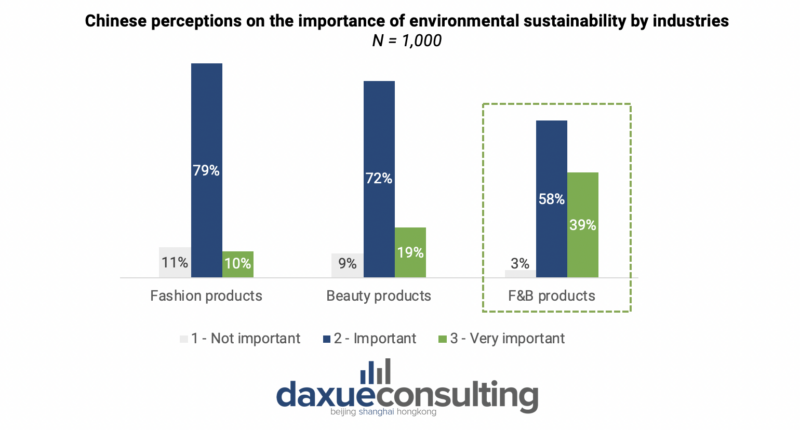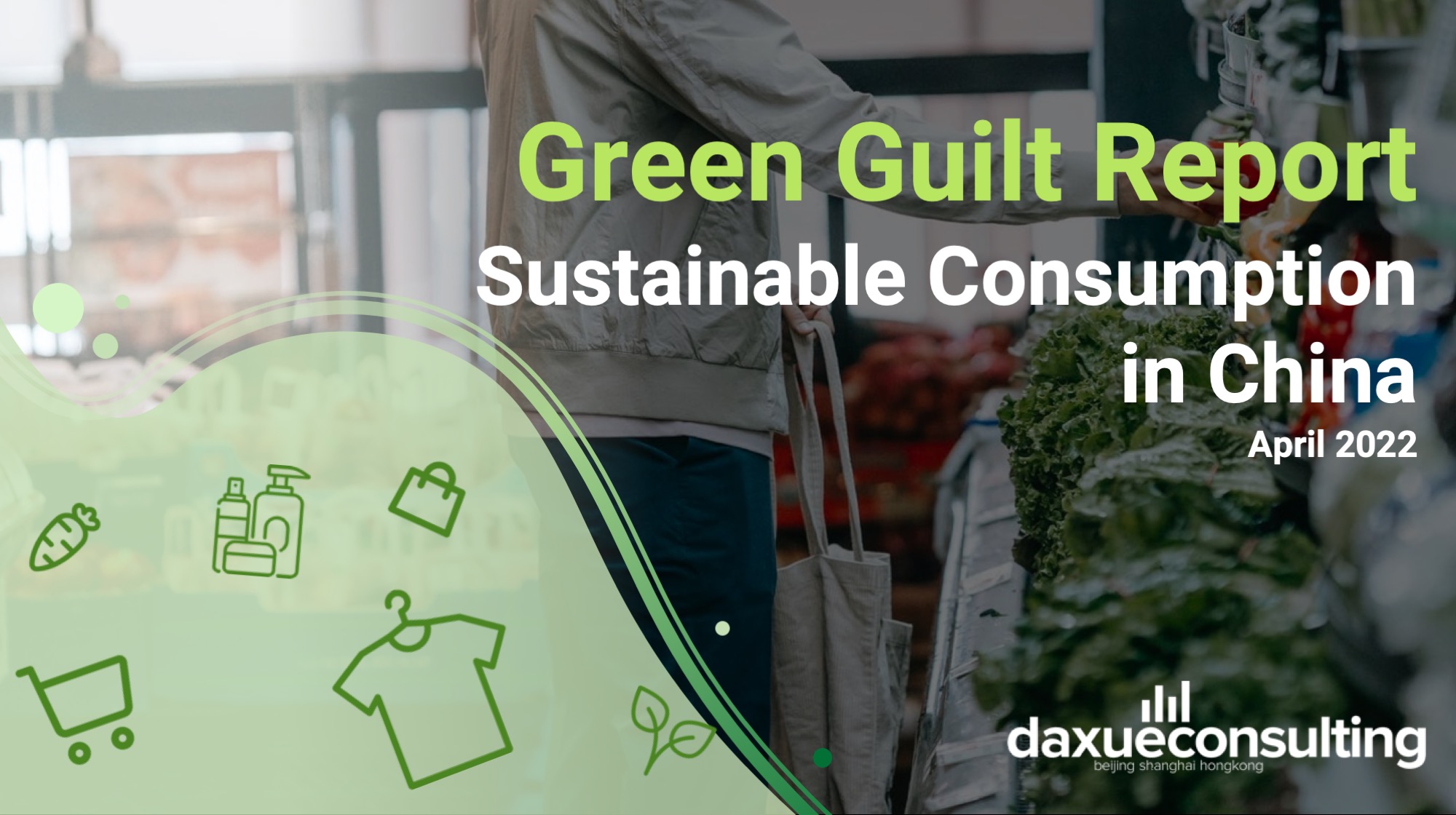Environmental sustainability has become a growing trend in China, not just for PR strategy, but a necessity. Recently, it has been further emphasized by the impact of COVID-19 and the government’s goal of achieving carbon neutrality by 2060. Apart from businesses, we believe that consumers have the power to shift demand to greener alternatives. As a result, we surveyed 1,000 Chinese consumers on their beliefs, habits, and understandings of sustainability. While consumers are increasingly engaged in sustainable consumption in China, however, many of their perceptions and actions came as a surprise to us, which are highlighted in the report.
Download our full Green Guilt Report on Sustainable Consumption in China
Setting the scene: What actions are perceived as “green” in the eyes of Chinese consumers?
Chinese netizens often view sustainability as a tool to protect the environment and reduce carbon emissions. Our survey results show that waste sorting is recognized as the most eco-friendly action among Chinese respondents. This can be explained by the government’s continuous promotion of this topic and indicates the government’s strong influence over Chinese consumers’ perceptions. What stands out is that 28% of our Chinese respondents believe meat consumption is irrelevant to sustainability. Yet, in fact, the global food system makes up 37% of all manmade greenhouse gas in the world.

The results of our survey also show that younger Chinese respondents with higher income and educational backgrounds are more inclined to change their purchasing behavior due to sustainability concerns. The common denominator of these groups is their higher environmental awareness. Access to better education increases such awareness and higher-income groups are often correlated with a higher education status as well as meeting the financial fit to make sustainable purchase decisions. Similarly, younger Chinese are more exposed to social media where sustainable lifestyles are often being promoted.

The relevance of sustainability for different industries
F&B industry
The highest interest in sustainable products can be found in the F&B industry. 97% say they believe environmental sustainability has at least some importance when buying food and beverage products. The reason for this is, however, not necessarily to protect the environment, but the linkage between sustainability and health that Chinese consumers make. Chinese consumers present an ever-growing health consciousness mainly driven by government policies and the impact of COVID-19.

Beauty industry
There is a rising trend for clean beauty among Chinese consumers backed by their increasing requirements for safe, natural, and functional beauty products. What stands out, is that brands incorporating traditional Chinese medicine (TCM) are particularly on the rise for green beauty. However, this is still a niche market as more than one-fifth of our respondents are uncertain about potential clean beauty brands.
Fashion industry
While sustainable fashion appears to be popular among the younger generations and consumers from upper-middle-income groups, 11% of our respondents believe that environmental sustainability is irrelevant when purchasing fashion products. The majority of the clothing purchases in China are based on fast fashion trends, resulting in 26 million tons of clothes being thrown away every year, with less than 1% of them being reused or recycled. The main reason being is that there is a stigma around second-hand clothing over hygiene and uncertainty concerns. Yet, 40% of the younger respondents are willing to try second-hand clothing.
Hypotheses for the future of sustainable consumption in China
Although green consumerism has become more prevalent in China, brands must act accordingly to accommodate the everchanging “greener” consumer behavior. What can brands do to market sustainability to cater to Chinese consumers? And which industries will be more favored of aligning with the carbon-neutral plan by 2060? Daxue Consulting investigated four hypotheses on the future of sustainable consumption in China.
1. As long as sustainability is associated with health and safety, it will be prioritized by Chinese consumers
Despite consumers making more sustainable consumption in China, the concern over health outweighs concerns over the environment. However, products that are healthy tend to align with green consumption, as a result, Chinese consumers are very willing to consume products that have smaller ecological footprints.
2. The government propaganda will be the strongest factor in influencing Chinese perceptions of sustainability
In achieving carbon neutrality by 2060, environmental sustainability has been heavily promoted by the government and the Chinese media. As Chinese consumers’ perception of sustainability adheres to the government, brands can take advantage of this opportunity and promote sustainability-related campaigns in accordance with the regime and consumers’ desires.
3. A potential growth for green consumerism exists in the mass market as it is not only driven by environmental activists and there are few climate change deniers in China.
Overall, the Chinese mass market has an unpolarized perception of climate change and the environment. This demonstrates that there is room for mass-market brands to incorporate sustainability into their Chinese business models.
4. In China’s journey to zero-carbon, the transition of the meat industry will be eluded for a longer time
The government’s recommendation of reducing meat intake in China was related to the prevention of chronic conditions, rather than the environment. One reason being China’s main meat sources consumed is pork and chicken, which have significantly smaller environmental footprints in comparison to beef.





